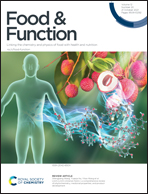Fructooligosaccharide supplementation alleviated the pathological immune response and prevented the impairment of intestinal barrier in DSS-induced acute colitis mice†
Abstract
The dysbiosis of gut microbiota is closely related to the occurrence and development of inflammatory bowel disease (IBD). The manipulation of intestinal flora through prebiotics or probiotics is expected to induce and maintain the remission of IBD symptoms. 6-week-old C57BL/J mice were daily gavaged with fructooligosaccharides (FOS) or the synbiotic two weeks before the administration of dextran sulfate sodium (DSS). The supplementation of FOS or synbiotic could significantly ameliorate the body weight loss and colon histological damage in DSS-induced acute colitis mice. The altered composition of gut microbiota in acute colitis mice was reversed by FOS or Synbiotic supplementation, with a characteristic of decreased abundance of Mucispirillum. Both FOS and synbiotic mitigated DSS-induced loss of mucus protein (MUC2) and epithelium tight junction proteins (ZO-1, Occluding, Claudin1) in colon mucosa. The expression of pro-inflammatory cytokines (IL-6 and TNF-α) was decreased by FOS or synbiotic treatment, while the expression of Tbx21 and IL-10 was increased. The results suggested that the modulation of gut microbiota by FOS or synbiotic supplementation could decrease the inflammation potential of colonized commensals, which prevented the impairment of the intestinal barrier and induced a regulation of immune response in DSS-induced acute colitis mice.



 Please wait while we load your content...
Please wait while we load your content...